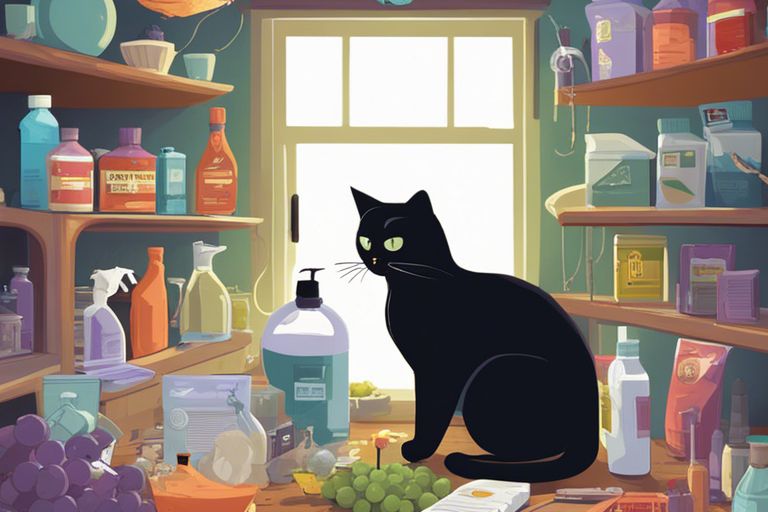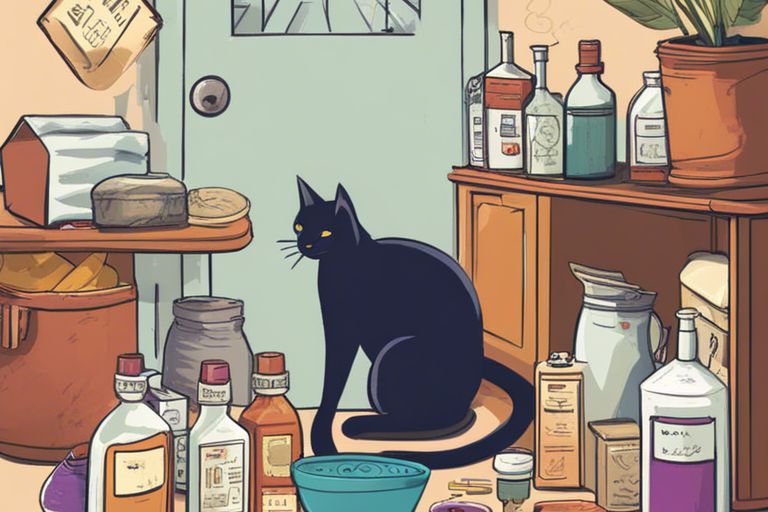Hey there, feline owner! Did you know that there are several household items that can be extremely dangerous for your beloved cat if ingested? From common foods to everyday objects, it’s important to be aware of the potential hazards lurking within your own home. Items such as chocolate, lilies, medications, and alcohol can pose a serious threat to your furry friend’s health. In this blog post, we’ll dive into the top household dangers for cats and provide you with essential tips on how to keep your pet safe. So, let’s ensure that your home is a safe environment for your cat by being informed and proactive about potential hazards.
Key Takeaways:
- Many household items can be dangerous for cats if ingested. Common items such as medications, household cleaners, certain plants, and small objects pose a threat to cats if swallowed. It’s important for cat owners to be aware of these potential hazards and take necessary precautions to keep them out of reach.
- Certain human foods can be toxic to cats. Foods such as chocolate, onions, garlic, and grapes can be harmful if consumed by cats. It’s vital for cat owners to be mindful of what foods are safe for their pets and to avoid feeding them these toxic items.
- It’s crucial for cat owners to familiarize themselves with potential household dangers and seek veterinary care immediately if ingestion occurs. Time is of the essence when it comes to a cat ingesting a toxic substance. Seeking prompt medical attention can mean the difference between life and death for the animal, so it’s essential for owners to be prepared and informed.
Human Foods Toxic to Cats
Obviously, as a responsible cat owner, you want to ensure that your feline friend stays safe and healthy. One of the ways you can do this is by being mindful of the human foods that can be toxic to cats if ingested. While it may be tempting to share some of your favorite snacks with your furry companion, it’s important to be aware of the potential dangers associated with certain foods.
Onions, Garlic, and Chives
Onions, garlic, and chives can be toxic to cats. These ingredients contain compounds that can cause damage to your cat’s red blood cells, leading to anemia. Even small amounts of these foods, whether raw, cooked, or in powdered form, can be harmful to your cat. Be sure to keep these items out of reach and never allow your cat to ingest them.
Chocolate and Caffeinated Items
Chocolate and other caffeinated items pose a serious threat to your cat’s health. These substances contain methylxanthines, which can cause symptoms such as vomiting, diarrhea, rapid breathing, and even seizures. It’s important to keep all chocolate and caffeinated products, including coffee, tea, and energy drinks, away from your cat at all times.
Grapes and Raisins
Grapes and raisins can be extremely dangerous for cats. Even small amounts of these fruits can cause kidney failure in cats, potentially leading to serious health issues. It’s essential to be vigilant and ensure that your cat does not have access to any foods containing grapes or raisins.
Alcohol and Raw Dough
Alcohol and raw dough are two items that should never be ingested by your cat. Alcohol can cause intoxication, leading to vomiting, disorientation, and even coma in cats. Raw dough, on the other hand, can expand in your cat’s stomach and cause digestive issues. Ensure that these items are kept well out of your cat’s reach at all times.

Household Plants That Pose a Threat
To ensure the safety of your beloved feline, it is vital to be aware of the household plants that can pose a potential threat to their health. Many common household plants are toxic to cats and can lead to serious health issues if ingested. Here are a few household plants that you should be cautious about when it comes to your feline friend.
Lilies and Their Varieties
Lilies, including Easter lilies, tiger lilies, and Asiatic lilies, are extremely toxic to cats. Even ingesting a small amount of any part of a lily plant, including the leaves, petals, or pollen, can potentially lead to kidney failure in your cat. If you suspect that your cat has ingested any part of a lily plant, it is crucial to seek immediate veterinary care. Keep these flowers out of your home if you have a feline companion to ensure their safety.
Sago Palm and Other Toxic Plants
The Sago Palm is one of the most dangerous plants for your furry friend. All parts of the Sago Palm, including the seeds, leaves, and roots, contain a toxic substance called cycasin, which can cause liver failure in cats. In addition to Sago Palms, other common household plants, such as azaleas, rhododendrons, and dieffenbachia, can also be harmful if ingested. It is essential to keep these plants out of reach of your cat or consider removing them from your home altogether to avoid any potential risk.
Household Chemicals and Medications
Keep your furry friend safe from household chemicals and medications that can be harmful if ingested. Cats are naturally curious creatures and may be attracted to items that have a strong smell or unusual taste. Here are some common household hazards to be aware of.
Cleaning Agents and Detergents
Cleaning agents and detergents can be extremely dangerous for your cat if ingested. The chemicals in these products can cause irritation to the mouth, throat, and stomach, and in some cases, they can lead to more severe symptoms such as vomiting, diarrhea, and difficulty breathing. It’s important to store these products out of your cat’s reach and ensure that they are securely capped at all times. Always use cleaning agents and detergents in well-ventilated areas and allow surfaces to dry completely before allowing your cat into the cleaned area.
Human Medications and Supplements
Your cat should never have access to human medications and supplements. Many common medications such as painkillers, anti-depressants, and vitamins can be toxic to cats and even small amounts can be extremely dangerous. Always store your medications in a secure place, and never leave pills or tablets out where your cat can access them. If you are unsure about a medication’s safety for your pet, consult with your veterinarian.
Antifreeze and Rodenticides
Antifreeze and rodenticides are among the most dangerous household chemicals for cats. The sweet taste of antifreeze can be appealing to cats, but even a small amount can cause kidney failure and death. Rodenticides can cause severe internal bleeding and other serious health issues. Keep these products securely stored and ensure that your cat has no access to them. If you suspect your cat has ingested antifreeze or rodenticide, seek immediate veterinary care.
Other Common Household Hazards
Despite your best efforts to keep your home safe for your feline friend, there are several common household items that can pose a danger to your cat if ingested. It’s important to be aware of these potential hazards and take steps to prevent your cat from coming into contact with them.
Small Objects and Toys
Small objects and toys, such as rubber bands, hair ties, and plastic parts from children’s toys, can be hazardous if ingested by your cat. These items can cause choking or intestinal blockages, which can be life-threatening. It’s important to keep small objects and toys out of your cat’s reach, and to regularly check your home for any potential hazards. In addition, make sure to provide your cat with safe, appropriate toys to play with, such as sturdy, non-toxic rubber or plastic toys that are too large to be swallowed.
Essential Oils and Diffusers
Many people use essential oils and diffusers to freshen their homes and create a relaxing atmosphere, but these products can be dangerous for cats. Some essential oils, such as tea tree oil and peppermint oil, can be toxic to cats if ingested or even if they come into contact with the skin. Ingesting essential oils can cause vomiting, drooling, difficulty breathing, and even organ damage. If you use essential oils or diffusers in your home, make sure to keep them out of your cat’s reach, and consider using them in a well-ventilated area where your cat does not spend a lot of time. It’s also important to carefully read labels and instructions for essential oils and diffusers, and to consult with your veterinarian if you have any concerns about their safety for your cat.
Conclusions
Presently, there are several household items that can be dangerous for your cat if ingested. These items include certain foods like chocolate, garlic, and onions, as well as medications such as acetaminophen and ibuprofen. Additionally, some houseplants like lilies and poinsettias are toxic to cats if consumed. It’s important to be mindful of where you place these items in your home and to keep them out of reach of your feline friend. In the event that your cat does ingest any of these dangerous items, it’s crucial to seek immediate veterinary care. By being aware of these potential hazards, you can help keep your cat safe and healthy in your home.














